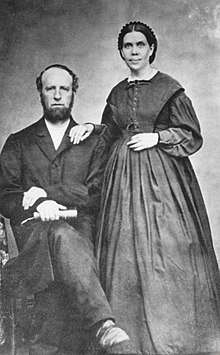Adventist Society for Religious Studies
The Adventist Society for Religious Studies (ASRS) is a Seventh-day Adventist scholarly community whose purpose is "to provide intellectual and social fellowship among its members and encourage scholarly pursuits in all religious studies disciplines, particularly with reference to the Seventh-day Adventist tradition." It was formally organized in New York City in 1979.[1] It is more liberal than the other main Adventist theological organization, the Adventist Theological Society, which is more conservative.
| Part of a series on |
| Seventh-day Adventist Church |
|---|
 |
|
|
|
Organization Divisions
|
|
| Adventism |
History
In 1972 Adventist religion scholars agreed to meet in conjunction with the annual meetings of the American Academy of Religion (AAR) and Society of Biblical Literature (SBL). The official Adventist Biblical Research Institute (BRI) agreed to sponsor and plan these meetings.[2]
After BRI ceased their sponsorship in 1978, Adventist scholars met informally at New Orleans. AAR/SBL informed the Adventist group that it could not provide meeting rooms nor announce the meetings in its printed program unless the group officially organized and adopted a distinctive name that did not have a denominational identifier. The group officially organized in 1979, selecting the name Andrews Society for Religious Studies,[2] and elected officers; at the New York meeting. The name Andrews referred to J. N. Andrews, who is considered to have been the first Adventist religion scholar.
In 1993 the society unanimously voted to change its name to the Adventist Society for Religious Studies. This became possible when AAR/SBL lifted the restrictions on denominational names.
In 1996 the society had a membership of 135 scholars.[3]
The 2020 meeting of the Society will convene in Boston, Massachusetts on November 19–21, 2020. The theme for the meeting is "Sabbath: Rest, Roots, and Resistance".
List of presidents
The president of ASRS is elected three years in advance and future presidents serve as vice-president and president elect prior to serving as president.
- 1979 William G. Johnsson
- 1980 Fritz Guy
- 1981 Robert M. Johnston
- 1982 George Reid
- 1983 Walter Douglas
- 1984 Richard Coffen
- 1985 Doug Clark
- 1986 Sakae Kubo
- 1987 Alden Thompson
- 1988 James Londis
- 1989 Richard Rice
- 1990 Russell Staples
- 1991 Pedrito U. Maynard-Reid
- 1992 Gerald R. Winslow
- 1993 Warren C. Trenchard
- 1994 Madelynn Haldeman
- 1995 Roy Branson
- 1996 Jon Dybdahl
- 1997 John Brunt
- 1998 Larry Geraty
- 1999 Roy Adams
- 2000 Ernie Bursey
- 2001 Keith Burton
- 2002 Kendra Haloviak
- 2003 Ivan Blazen
- 2004 Jon Paulien
- 2005 Jean Sheldon
- 2006 P. Richard Choi
- 2007 David Taylor
- 2008 John Webster
- 2009 Zdravko Plantak
- 2010 Bonnie Dwyer
- 2011 John Reeve
- 2012 Don Walter Leatherman
- 2013 Carl Cosaert
- 2014 Ranko Stefanovic
- 2015 Mark Carr
- 2016 Teresa Reeve
- 2017 Olive Hemmings
- 2018 Tarsee Li
- 2019 Denis Fortin
- 2020 Matilda Frey
- 2021 Erik C. Carter
See also
References
- Plantak, Zdravko. "ASRS Official Web Page". adventistsocietyforreligiousstudies. ASRS. Retrieved 12 October 2015.
- "Adventist Society for Religious Studies" in Historical Dictionary of Seventh-day Adventists by Gary Land, p.14
- Adventist Religion Scholars Meet | Adventist Today Archived September 22, 2007, at the Wayback Machine
External links
- Adventist Society for Religious Studies official website
- "Too many theological societies?" by J. Robert Spangler in Ministry 62:6 (June 1990), p22–23